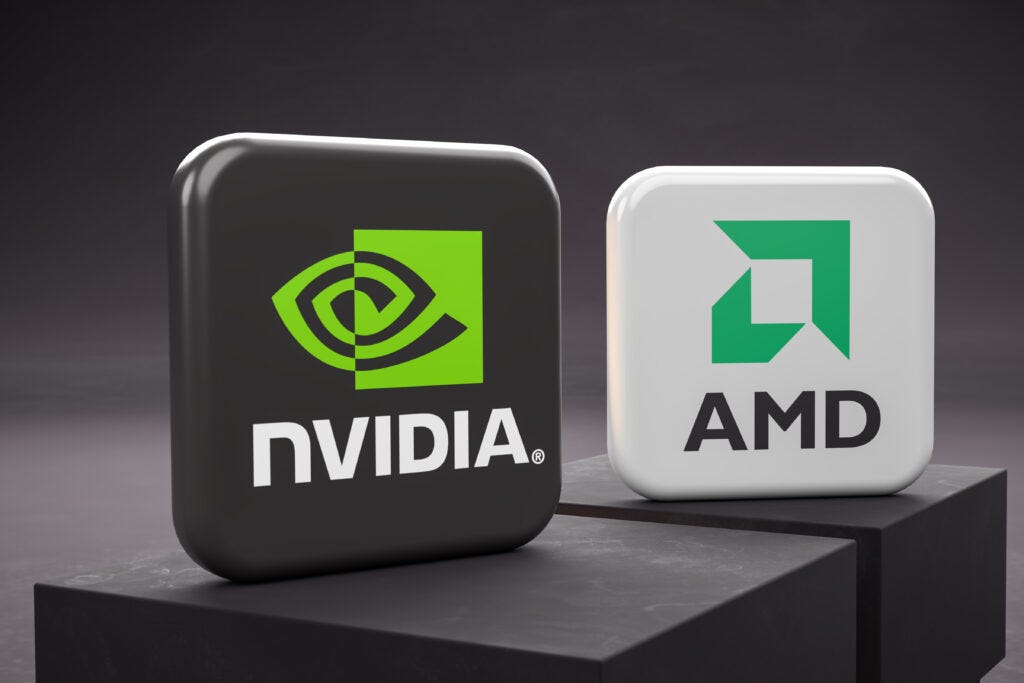In a monumental shift within the tech industry, Nvidia has dethroned long-standing leader Microsoft to become the world’s most valuable company by market capitalization. This significant achievement, reached in June 2024, marks the culmination of a remarkable stock price surge fueled by Nvidia’s dominance in the booming field of artificial intelligence (AI).

The Power of AI Chips Drives Nvidia’s Growth
The secret sauce behind Nvidia’s success lies in its leadership within the AI chip market. These specialized chips are the workhorses that power the development and execution of AI software – a rapidly growing field with applications that span industries like healthcare, finance, and autonomous vehicles.
Nvidia’s dominance in this critical sector is undeniable. With an estimated 80% market share in the data center AI chip market, the company enjoys a significant advantage. This translates to a constant stream of revenue as companies around the world invest heavily in AI development, all the while relying on Nvidia’s cutting-edge technology to make it happen.
From Gaming Roots to AI Powerhouse
Interestingly, Nvidia didn’t always focus on AI chips. The company’s roots are in developing graphics processing units (GPUs) primarily for the gaming industry. However, under the visionary leadership of CEO Jensen Huang, the company made a pivotal strategic shift in the 2000s. Recognizing the immense potential of AI, Nvidia began heavily investing in developing GPUs specifically tailored for applications beyond gaming. This foresight proved to be a game-changer, positioning Nvidia perfectly to capitalize on the explosive growth of the AI market.
Investor Confidence Fuels the Rise
Beyond its strong market position, investor confidence plays a crucial role in Nvidia’s skyrocketing valuation. The company has consistently exceeded analyst expectations with robust sales and profit figures, solidifying its reputation as a leader in the AI space. This positive outlook has fueled investor enthusiasm, pushing Nvidia’s stock price to record highs. In 2024 alone, the stock price nearly doubled, and the long-term trajectory is even more impressive – a staggering 591,078% increase since the company’s IPO in 1999.
Challenges on the Horizon: Maintaining Dominance in a Competitive Landscape
While Nvidia currently reigns supreme in the AI chip market, some analysts express concerns about the company’s ability to maintain its long-term dominance. This high-stakes field is fiercely competitive, with tech giants like Microsoft, Google, and Apple all actively vying for a leading position. As these competitors invest heavily in developing their own AI technologies, Nvidia could face significant pressure to maintain its market share.
The Monetization Question: A Potential Hurdle for AI Growth?
Another potential hurdle on the horizon relates to how Nvidia’s customers ultimately plan to monetize AI software. If developers struggle to find profitable applications for their AI creations, it could dampen demand for Nvidia’s chips – the hardware backbone of this software. This is a complex issue that could significantly impact the future trajectory of the entire AI landscape.
The Future of Nvidia: A Leader in the AI Era?
Despite these potential challenges, Nvidia’s current status as the world’s most valuable company undeniably reflects its success in capitalizing on the AI revolution. The company’s innovative technology and strategic vision have propelled it to the forefront of this transformative field.
Whether Nvidia can maintain its leadership position remains to be seen. However, one thing is certain: the company is a pivotal player in the AI landscape, and its future in this rapidly evolving field promises to be exciting to watch.
Frequently Asked Questions:
Q: How did Nvidia become the world’s most valuable company?
A: Nvidia’s dominance in the AI chip market, fueled by its cutting-edge technology and strong market share, has been the primary driver behind its surge in value.
Q: What exactly are AI chips?
A: AI chips, also known as AI accelerators, are specialized processors designed to handle the complex computations required for developing and running AI software. These chips offer significant performance advantages over traditional CPUs in tasks involving artificial intelligence.
Q: Why is Nvidia worried about how its customers monetize AI software?
A: Nvidia’s business model relies on companies investing in AI development and subsequently purchasing their AI chips to power their AI software. If developers struggle to find profitable applications for their AI creations, it could lead to a decrease in demand for Nvidia’s chips, impacting their revenue stream.
Q: What are some potential challenges Nvidia might face in the future?
A: Increased competition from tech giants like Microsoft, Google, and Apple who are heavily investing in their own AI technologies is a major concern. Additionally, the overall growth of the AI market could be hindered if developers struggle to find profitable applications for AI software.
Q: Is Nvidia’s future secure even with these challenges?
A: While challenges exist, Nvidia remains a dominant player in the AI landscape. Its innovative technology and strong market position make it a key player in the future of AI. The company’s ability to adapt and innovate will be crucial in maintaining its leadership position.
Q: What does this mean for the future of AI?
A: Nvidia’s rise highlights the immense potential of AI and its impact across various industries. While challenges remain regarding monetization and competition, the future of AI looks promising with companies like Nvidia leading the charge in developing powerful, efficient AI technology.




